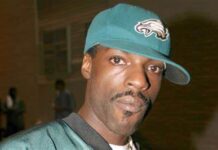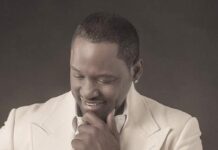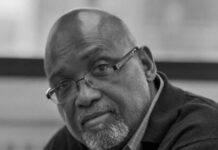
(Source: Dimitrios Kambouris/Getty Images North America/ZIMBIO)
*Actress/singer Keke Palmer rose to prominence in 2006 for her breakthrough role in Akeelah and the Bee and she has since become one of the leading black starlets in Hollywood.
Apart from her work in music and film, Palmer has also starred in numerous television films and series, including the lead role in Nickelodeon‘s sitcom True Jackson, VP (2008-2011). She earned $20,000 per episode on the series, which made Palmer the fourth-highest-paid child star on television.
Most recently, she was a regular on Fox’s campy horror series Scream Queens, and she recently made her guest star debut on Lee Daniels’ music drama series Star. You can also catch Keke as April Lewis, the newest and youngest case officer to join the team of elites on the hit spy drama, Berlin Station.
Created and executive produced by Olen Steinhauer, Berlin Station is back for its second season on EPIX, with Ashley Judd also joining the cast that includes Richard Armitage, Rhys Ifans, Richard Jenkins, Michelle Forbes and Leland Orser.
April Lewis is assigned to Berlin Station on her first field assignment after making her mark as an analyst at Langley. Her approach often clashes with her old-school colleagues in a system struggling to preserve its besieged identity. But she is no less determined to make her mark in Berlin as she did back home at headquarters.
EUR/Electronic Urban Report correspondent Ny MaGee sat down with Palmer during 2017 Summer TCA to dish about the series and her “Black in Berlin” experience. She also shared her thoughts about the union’s responsibility to provide mental health checks on child performers.
Check out our conversation below.
OTHER NEWS YOU MIGHT HAVE MISSED: Director Bill Condon Relives the Magic with ‘Dreamgirls’ Extended Edition [EUR Exclusive]

(Source: Frederick M. Brown/Getty Images North America/ZIMBIO)
Inquiring minds would like to know what it’s like being Black in Berlin?
KP: At first I didn’t think about the fact that I’m Black in Berlin or Black in Germany. I was really excited with the idea that I wouldn’t be as recognizable, ‘cause I was like, “They ain’t going to know who I am over here.” So I’m excited to just kinda blend in and just become unnoticed. So initially I was like, “Okay, I actually am noticeable over here. I do have fans over here.” They watch American TV just as Americans do. And then secondly, I got the idea that they weren’t as used to seeing as many Black people around. I got a lot of looks and a lot of stares. I don’t know if it’s ‘cause I’m cute or ‘cause they confused or wondering (when) you got here. I didn’t try to think about to too much. But I also thought, maybe there’s not a lot of black people in this area. It’s very interesting, especially with me moving to Atlanta. It’s black people everywhere then you have California where I grew up, which is completely diverse. It’s not at all like Berlin where you don’t see damn near any black people, anywhere. It’s a culture shock.
You said during the Berlin Station TCA panel that April is doing things on the ground that you would like to do personally. Can you elaborate?
KP: She’s a CIA Agent and I can’t really handle guns in everyday life, and it’s not something I would want to do in everyday life, but at the same time, I would just because it seems cool and seems dope but I wouldn’t want to hurt anybody. So to be able to act it out in film or television is really an awesome thing for me. So that’s what I meant, like, I actually get to handle a gun. I get to kill a couple folks. I love that aspect of it because it makes me feel strong. I like when I have opportunities as a woman to do stuff that they only usually let the guys do. I really love that. It’s empowering.
How challenging is it to come in and work with a cast that’s already really clicking?
KP: I think it’s challenging in the sense where they’ve already clicked so you’re just trying to find your wave and get to know everybody and sometimes you don’t have scenes with everyone and by the second season everybody has had at least one scene with one another. So you’re just trying to get your feet wet and start conversation. But once you get in there you start working with people and have more scenes with people, then you’re getting the vibe and getting the whole group.
Describe the dynamic between April and her male colleagues.
KP: There’s definitely a lot of misogynistic undertones but I can’t say that April has felt them directly in this season but it has been showcased throughout the show. Her colleagues are older. She’s the youngest agent there and she’s very much still an idealist. She’s been in school and filled with these ideas of what it will be like when she works for the CIA and now that she’s actually in it, she’s seeing that’s it not how she thought it was. So she’s coming in lighting a fire and she’s excited and she has this high spirit and they’re kinda like, “It’s a job. We do what we can when we can and that’s pretty much it.” So she faces a lot of that in the beginning of the season.
And how does that tie-in with the obstacles she faces this season?
KP: She faces a lot of internal turmoil with being an idealist and realizing that the CIA isn’t about an ideal. It’s not about being heroes and that’s what she thought it was. She finds out through the course of some of her missions and what she has to say something about or not say something about that — what choice does she make in terms of her principles and being part of an organization that she’s worked so hard to be a part of.
Why do you think political shows resonate so heavily with audiences?
KP: The same reason why people write ‘em and create ‘em is the same reason why people watch ‘em. They want to know what could happen if… Or, what if we take it there, or I feel like misogyny is at an all-time high, let’s create a show like Handmaid’s Tale. You know what I mean? Like, literally things that make people think in their mind “I don’t like this or I do like this or I want to explore this.” Our president is sexist, racist, ageist — what would happen if he was directing certain things with people in Germany to create certain outcomes, what would that look like? Berlin Station explores that and I think it’s because people want to know and we’re in those times where it’s very topical and as a young person being a part of this show, that wasn’t something that I expected to get as much interested in but I did because it gave me insight. Like, damn, what if?
So I’m excited to be on this show and excited for my fan group to become a part of the show because we, unfortunately, are becoming that age now where it’s us now. It’s on our backs. So to be able to be a part of a show like that is really exciting because, again, it gave me insight and I know it’s going to give them some. It’s like wow, this political game is nothing to play with. And if we don’t wake up and do our bid then we’re going to be in some trouble.

What are you hoping viewers are left thinking and talking about after each episode?
KP: I think what I can take away on just the simplest level is that you have to be true to yourself and you have to make choices and actions based off what you believe is right. Even if sometimes you second guess or you’re not completely sure if you did the right thing. You have to be true to yourself and you have to learn to live with the choices and the decisions that you make. In terms of the bigger scale of our society, we have to pay attention. We have to pay attention and we have to care. Because when we go to sleep at the wheel and we don’t really look at what’s going on, that’s when things get completely out of our hands. I think it’s really going to shine a light on the fact that we’ve been sleeping. Something’s been going on where we haven’t really been paying attention on any scale because it’s just gone too far and it can go even further.
Do you think this series can inspire young activists today?
KP: Absolutely. And again, I’m so happy to be playing the character of April because April has that. She is in the CIA but she ain’t happy with what the CIA is doing all the time. She has this rebellion in her that I truly admire ‘cause I don’t know if I could really do that. She’s playing hardball. She’s playing with government officials — backdoor shit and she’s not afraid to step outside of what she’s supposed to do and she actually gets in trouble for a lot of that, but she still keeps doing it.
I follow your career. I follow you on social media. You’re outspoken. You seem fearless and a part of you does seem a little rebellious. So don’t you relate to April in many ways?
KP: (laughs) It’s so funny ‘cause I think sometimes that I don’t but then I’m like, “Well girl, you done did some of the stuff that April has done.” But when you’re just being true to yourself you don’t think of it as “I’m being an activist.” You’re just thinking I’m being true to myself and I think that’s what it comes down to. Young people today, when we have the opportunity to feel accepting of one another, or accepting of ourselves to then accept others, we can actually see how we can make things better. But when we are in a society that’s constantly telling us to deny ourselves physically, emotionally and everything in between, it kinda is difficult to accept who we are and to be able to express that in these major ways. There was a time where you had people my age and younger saying “I want to be the Mayor. I want to be a senator.” That was something that was exciting but if you don’t know yourself and know who it is you want to be in the world, it becomes hard to identify with such great goals.
Are there certain qualities or attitudes in women that you enjoy exploring through your work?
KP: Masculinity. A lot of times people act as if you’re not a normal female depending on the amount of masculinity you have in your persona. Again, misogyny is something that’s been big in our world for a long time and I didn’t feel it directly until I became an adult. Just me knowing what I want to say and looking a man directly in his eyes, sometimes, I feel the uncomfortable coming from them. So in my characters (I’ve) really just been exalted in this idea that I get to play these roles where these women are teeter-tottering on that line of what you think they should be and most of the time they’re not what you think they should be. They talk too much. They have too much to say and maybe too smart and I love that. ‘Cause I think girls need to see more of that and to know that it’s not weird that you see what’s going on and you want to speak up about it. It’s not odd that you walk with a strut. That doesn’t mean anything about who you are other than that you’re cool. And I love that. I want to see more of that.

(Source: Rachel Murray/Getty Images North America/ZIMBIO)
Tell us about your new digital series, That’s The Gag.
KP: It’s a mockumentary of pretty much the industry and how I’ve grown up and the changes and the different things that I decide to do and how my fans or how society responds to that and just me pretty much saying, like, “Yo, I don’t take myself that seriously, and even though this industry seems as if it’s this serious place, and it can be, you can also laugh at yourself and you can also get an inside look at at the same time.
On that note, what’s something you know now that you wish you had known when you were first starting out in this business?
KP: I wish I knew about the sacrifices. I think I still would have made them but I think if my family and I knew of the sacrifices and how it could affect family dynamics — just like anybody, just like if you’re a little kid and you’re always traveling for soccer, or if you are a dad and you’re in the military — I think you always have to pay attention to how those things will affect your family and we really didn’t think about me being a child star. So aside from the fact that my career was growing, then you have the whole thing where I became popular for it and that just adds a whole different level of sacrifice and dynamic shifts and I think if I knew that, what fame could do, and I knew what sacrifice I would have to make for the industry, then my family and I would have been able to make preparations for that. But there’s no way you can do that because I had to live it to know it and that puts me in such a powerful position as a young entertainer because I can give what wasn’t given to me and I can also give what was given to me. I know where things could have been better.
I’m a stronger believer in one day we’re going to have therapists in the SAG/AFTRA Guild for the kids because I think kids should have therapists on these shows. I think they should have a therapist come to these sets once a week and talk to these kids. Once a week, the kid gets to talk to a therapist about everything they’ve experienced and what they’re doing for this project and their work schedule. That would be unbelievable. Me and Abigail Breslin talked about this on Scream Queens. We both were like, we need to go into SAG and do this together. I started acting at 9 she started acting at 5. I (saw) her crying, the most magnificent performance I had seen on Law and Order: SVU from a child actor but how did she go there?
No one is thinking. No one is caring. No one is asking those questions then talking to these kids. So it’s awesome when I’m talking to my peers and they share the same thoughts that I do. All of my young acting peers, we share those same thoughts. This should be implemented because this is important. Because nobody can tell you, after (you’ve) thought about and dreamt about your momma dying to get the tears out on a crying scene, nobody is telling you where to take that emotion. Nobody is telling you what to do because your emotions don’t know that it’s a joke. Actors are emotional daredevils. The places that we have to go sometimes. Look at Heath Ledger. We have to go to some dark places sometimes and we do it because we care. We love it. We want people to see themselves when they see the screen. We want them to know we see your madness. We see your pain, your happiness, your sadness, your love, your loss, and we felt it before and we want to feel it to express it to you. No one is thinking that and explaining that to these people, especially the youth.
So sometimes we grow up and don’t know what to do with the leftover emotional turmoil that we’ve gone through from this character to this character. By the time my grandmother passed away I had barely any tears to shed because I had already thought about her dying 50 million other movies before. So I really am excited for the opportunity to be able to help implement some of those things that I experienced. I’m a strong believer that tough times are necessary. And that’s another thing, as a young person, we always have to remind ourselves that tough times are necessary for life. They’re needed, even though they hurt. They allow you to expand and grow and they allow you to be able to help someone else.
Stream the latest episode of Berlin Station at epix.com.
New episodes air on the EPIX channel Sundays at 9pm.
We Publish News 24/7. Don’t Miss A Story. Click HERE to SUBSCRIBE to Our Newsletter Now!





